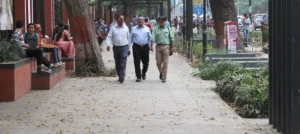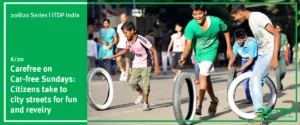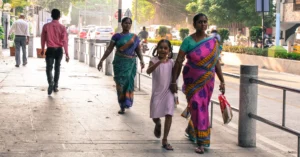
Written by Keshav Suryanarayanan
The Pondy Bazaar Pedestrian Plaza, one of Greater Chennai Corporation’s most anticipated projects, was launched with much pomp and show on the 13th November, 2019, by the Hon. Chief Minister of Tamil Nadu, Thiru Edappadi K. Palaniswami. Spanning over 700m on Sir Thyagaraya Road, the plaza has successfully transformed one of Chennai’s busiest and car-centric shopping streets into a pedestrian promenade by prioritising people over vehicles, and opening up new ways of experiencing the space. With wide and safe pedestrian walkways on both sides, ample shaded seating, beautiful landscape, and colourful play elements, the plaza was designed as a space accessible for all, including women, children, senior citizens and people with disabilities.
Written by Keshav Suryanarayanan
A couple with a stroller walks past the parade of shops, the infant’s eyes light up at the brilliant display of wares. A group of young women store-hop, hands full with bulging shopping bags bursting at their seams, but they still want to shop more. An elderly man on a wheelchair swiftly moves through the teeming crowd, pausing at places to enjoy the sights and sounds of the promenade. Musicians take over the streets as people walking by stop to listen, curious and pleasantly surprised. Two generations of family converse over fresh filter coffee, while the third-and the youngest- runs around and plays on the see-saw by the footpath.
Vibrant, attractive, lively, with spaces to walk, run, play, socialize, sit, linger and observe.
A street full of people. A street for people.
This is the New Pondy Bazaar Pedestrian Plaza!
The Pedestrian Plaza project was conceived with the intent of enhancing the unique shopping experience that Pondy Bazaar offers, by reclaiming public space for the shoppers. For the first time, Chennai is looking at a street as not just a mobility corridor, but as a social, public space for everyone, be it families, children, and the elderly.
An open-air mall in the heart of the city!

Shreya Gadepalli speaking at the launch
Shreya Gadepalli speaking at the launch
The event was also attended by government officials from the Roads and Family Planning Departments. Representatives from local organisations such as MASHAL, Centre for Environment Education, Parisar, Prasanna Desai Architects, and Shelter Associates suggested various ways for Pune to become a child-friendly city. The discussion brought up many important factors and considerations for the initiative to focus on.
The presentation session was followed by a panel discussion with Shreya Gadepalli, Rushda Majeed – Country Representative for India BvLF, Cecilia Vaca Jones – Progamme Director BvLF, Dinkar Gojare- Executive Engineer, PMC Roads Department, and Milind Khedkar- Medical Officer, PMC Family Planning Department, and moderated by Aswathy Dilip, Senior Programme Manager, ITDP India Programme.
The panelists and members of the audience had an active discussion that brought up many important factors and considerations for the initiative to focus on. The panellists emphasised the need for all developments to be done with a holistic and integrated approach. Policies and guidelines are necessary, but it is also the responsibility of citizens to participate in the process, demand, and ensure the maintenance of facilities used by the children. Members of the audience also highlighted the importance of scaling up the initiatives to the city level through quick steps like Tactical Urbanism interventions.

Speaking about the factors to ensure scaling up of the initiative, Cecilia said, “It is vital to have continuous documentation of what is working and what is not, and a good communication strategy to scale up the work at the state and national level. Understanding the financing of such initiatives is also very important for a long term engagement.”
Speaking about the importance of safe and high quality urban mobility to ensure the wellbeing of children and their caregivers, Rushda Majeed said, “Babies and toddlers are dependent on their primary caregiver, be it mothers, fathers, elder siblings or grandparents, to get around. If walking conditions and public transport are poor, they are less likely to be able to go out with their parents and grandparents, have uncomfortable or long commutes, be exposed to unsafe environments, and have limited options for physical activities.”
Mobility policies that focus on ITC would equip decision makers to invest in sustainable mobility – walking, cycling, and public transport – with specific interventions and improvements dedicated for early childhood development to increase safety, convenience, and vibrancy of public spaces, and improve access to childhood services such as health care, education, and play.

With several developments to make the city more inclusive, Pune is already on its way to becoming a “City for all”. Highlighting the work done in Pune, Dinkar Gojare said, “The PMC has already adopted the Urban Street Design Guidelines, a “Pedestrian First” policy, and implemented several road safety improvement projects. 100 km of street redesign is already on its way. A Children’s traffic Club has been initiated, along with other place making projects. Open spaces are available but they are misused. We should begin with freeing up about 25% of them for projects that ensure early childhood development.”

The programme that is now set in motion will build on this work and see Pune transform itself into India’s first safe and accessible city for infants, toddlers and their caregivers and a model for other cities to emulate. The ITDP India team and BvLF will support PMC to make this dream a reality.
With a clear vision and people’s support, Pune is building a future where cities are designed for children. After all, a city for children is a city for all!
Recent Blogs


Carefree on car Free Sunday’s: Citizens take to city streets for Fun and Revelry

